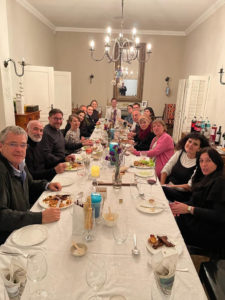Featured Item
Finding unknown family 70 years on
Little did Brian Lurie know that, at the time of his death, a search was going on which would result in information that would alter his family history forever.
Brian was born in Johannesburg in September 1943 to an unmarried woman, and was put up for adoption. “In those days, having a baby out of wedlock was frowned upon,” says Ora Villalobos, Brian’s biological sister. “She was 19. People do what they think is right. Perhaps she had old-fashioned values. Perhaps she was frightened of being judged.”
Brian was adopted by Cessie and Alec Lurie in Durban. Although he knew that he was adopted, he knew nothing about his biological family. His biological mother, Clare Friedland, went on to marry Nathan Wollach in 1945 and raised four daughters in her native Cape Town. The girls knew nothing about the brother that had preceded them.
“As kids, we always felt like there was some kind of secret, an invisible barrier between us and our mother. She carried an invisible burden. But not in a million, billion years would we have guessed what it was!” Ora says.
About seven decades later, a cousin accidentally spilled the beans in a conversation with Ilana Gaash, Ora’s younger sister. “She blurted out something about our brother. Ilana had no idea what she was talking about, but as soon as the truth dawned on her, things started to make sense,” Ora recalls.
The sisters, now living in the United States and Israel, went on a mission to find their long-lost brother, but they had very little information to go on.
“We didn’t even know his name. We just knew that he was born in Johannesburg in the early 1940s,” recounts Ora. “We hired an attorney and a social worker who specialises in this kind of thing, and we had to sue the department of social development to get access to files. Luckily, permission was granted.”
At the same time, across the world, Brian’s daughter, Joanne Lurie, was also researching her past. “By some amazing coincidence, Joanne picked us out on a community forum about adoption. What luck and karma was that!” Ora says. They ran DNA tests, which confirmed a match. They had found family!
Perhaps the saddest part of this story is that Brian passed away just a month before they found him. “Because the family secret was kept for all those years, we never got to meet him,” says Ora with a sigh. “It was hard to swallow that. It was extremely frustrating.” Ora says she’s not angry with her family for keeping secrets from her. “We can’t really blame anyone,” she says. “People did what they thought was best. But it was frustrating, especially the timing. However, we have to look at the positive: we finally got the truth.”
After COVID-19 restrictions were lifted, Ora made the journey to South Africa to attend the unveiling of Brian’s tombstone. “It was a wonderful trip and a celebration of Brian’s life,” she says. “We finally got to meet Brian’s family and embraced them into our lives.”
With Joanne living overseas, Ora met her brother, Wayne, and his eight-year-old son, Alec, in Johannesburg. “It felt completely natural,” she says. “He invited me to stay in his home, never having met me before, and it just worked. It wasn’t even awkward during our first meeting at the airport. It was absolutely awesome.”
Ora says she felt comfortable around Wayne, and that it was easy to talk to him because their outlooks on life are very similar. “It’s so clear that he’s genetically related to us,” Ora chuckles. “There are shared mannerisms and physical similarities. We even think the same way.”
“It’s an incredible story,” Wayne says. “It’s so ironic that I didn’t go looking for it, and yet suddenly, I have all this amazing family. We grew up knowing that my father had no siblings and that our family pool was very small. It’s lovely now to go from almost no family to such a wonderful big family.”
Wayne has loved getting to know his new extended clan in Johannesburg, spending Shabbats and yom tovs with them, and learning about each other’s past and present. “I’m dying to visit my aunts in Israel and am planning a trip there soon,” he says.

The quest is on to find more members of the long-lost family. “We keep hearing stories and names, and we’re pursuing every lead,” Ora says. They still don’t know who Brian’s biological father is, for example. “We’re still looking. We won’t give up.”
DNA tests point to Brian’s father being of English or Scottish descent. “From what we know from our research, he may have come from the United Kingdom,” she says. Apparently, Brian had even mentioned that his biological father may have come from England or Scotland. It’s possible that he came as a soldier stationed in South Africa, where he met their mother. It’s unlikely he’s still alive, but there may be descendants of his that would want to know about the family relation.
Ora used two global databanks in her search for her family: www.myheritage.com and www.ancestry.com. “You send for a test kit and mail back a swab of cells from the inside of your cheek. The company then analyses it and loads it into the database.” If someone strongly related to the family loads data, it will match.
At this point, the process has done everyone an amazing amount of good, says Ora. “Secrets aren’t healthy. We’re so happy to have had the opportunity to set the record straight.”
But the search isn’t over. Ora and her sisters are determined to pursue the hunt for Brian’s paternal family. By raising awareness, they hope to be able to piece more of the puzzle together. Anyone who has any information can contact Ora at orazoe10@gmail.com.